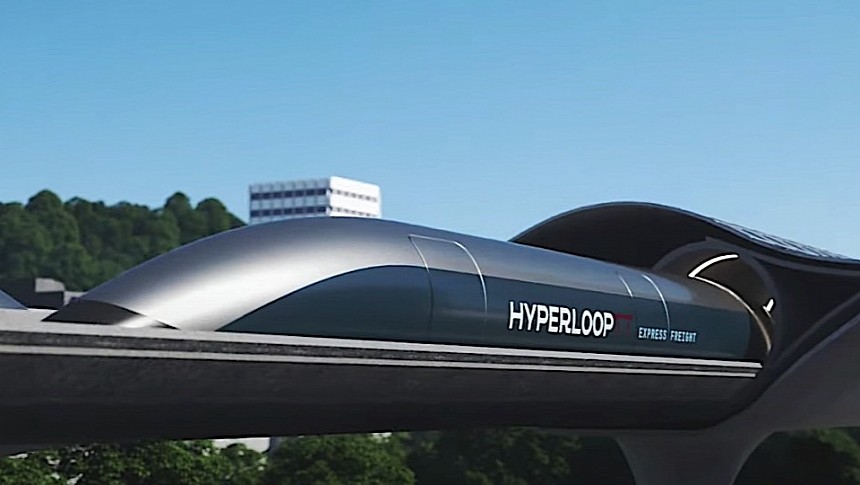Whereas some dreamers are imagining a future when humanity is traveling among the stars, others are looking for solutions to more immediate problems, such as the faster and safer transportation of people and cargo here on Earth. And it is this latter group that will rejoice a bit when seeing this.
Enter the Express Freight concept, a high-speed, capsule-based contraption that's meant to ride one of those hyperloop tunnels we keep hearing about. The concept is the work of a startup called HyperloopTT, and it's meant, unlike many of the other hyperloop ideas we've seen over the years, to move cargo, not people.
The driving force behind this idea is the fact freight transport is a huge business, and it's expected to grow a lot more in the coming years. For those in need of transport, shipping by means of aircraft may prove expensive, and by means of trucks may prove both expensive and lengthy.
The Express Freight should solve both problems. Because it's supposed to work in a hyperloop system it will undoubtedly be fast. It not exactly clear how fast, but the ideas in this field advanced by Elon Musk and Richard Branson over the years talked of somewhere around 760 mph (1,220 kph).
It will also be cheaper than current solutions thanks to some innovative ideas. That's because the Freight is supposed to use capsule designed for maximum freight volume: the floors are lowered to fit standard air cargo containers, and there is a pocket door between the structural ribs to gain more space.
The capsules that make up the system can be loaded and unloaded simultaneously and autonomously through staggered doors located on both sides of the capsule. Each door uses something called DockLock to allow them to connect to existing infrastructure.
It all sounds amazing, and HyperloopTT has even put a video together to give us an idea of how all of it is supposed to work. But is this something that we'll really get to see in action in our lifetime?
The company says it's fairly advanced with its plans, having already built a full-scale hyperloop facility and having secured over 40 patents for the technologies it will deploy in its hyperloop. There is even talk of it setting up "the first insurance framework and safety certification guidelines for commercial hyperloop systems."
To be honest though, as much as I'd like hyperloop systems to become a reality of our time, that probably won't happen anytime soon. And the apparent failure of Elon Musk's tunnel seems to prove that.
Why is that so? Building a hyperloop system to cover significant parts of a country (not to mention the world) seems a task too big for any single company to handle. This means that either all hyperloop companies come together in a common effort (unlikely), or governments get involved to support such projects. And, although some countries are doing that to some extent, large-scale involvement will probably not happen anytime soon.
The driving force behind this idea is the fact freight transport is a huge business, and it's expected to grow a lot more in the coming years. For those in need of transport, shipping by means of aircraft may prove expensive, and by means of trucks may prove both expensive and lengthy.
The Express Freight should solve both problems. Because it's supposed to work in a hyperloop system it will undoubtedly be fast. It not exactly clear how fast, but the ideas in this field advanced by Elon Musk and Richard Branson over the years talked of somewhere around 760 mph (1,220 kph).
It will also be cheaper than current solutions thanks to some innovative ideas. That's because the Freight is supposed to use capsule designed for maximum freight volume: the floors are lowered to fit standard air cargo containers, and there is a pocket door between the structural ribs to gain more space.
The capsules that make up the system can be loaded and unloaded simultaneously and autonomously through staggered doors located on both sides of the capsule. Each door uses something called DockLock to allow them to connect to existing infrastructure.
It all sounds amazing, and HyperloopTT has even put a video together to give us an idea of how all of it is supposed to work. But is this something that we'll really get to see in action in our lifetime?
The company says it's fairly advanced with its plans, having already built a full-scale hyperloop facility and having secured over 40 patents for the technologies it will deploy in its hyperloop. There is even talk of it setting up "the first insurance framework and safety certification guidelines for commercial hyperloop systems."
To be honest though, as much as I'd like hyperloop systems to become a reality of our time, that probably won't happen anytime soon. And the apparent failure of Elon Musk's tunnel seems to prove that.
Why is that so? Building a hyperloop system to cover significant parts of a country (not to mention the world) seems a task too big for any single company to handle. This means that either all hyperloop companies come together in a common effort (unlikely), or governments get involved to support such projects. And, although some countries are doing that to some extent, large-scale involvement will probably not happen anytime soon.







